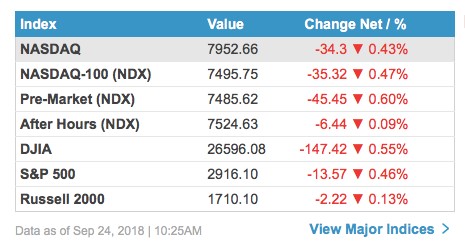The trade war just got real, with the official imposition of $200 billion in tariffs on Chinese goods just after midnight last night, followed by Beijing’s immediate retaliation of levies on $60 billion worth of U.S. goods.
It means that a massive line-up of goods from China will see a 10-percent tariff staring today, which will increase to 25 percent by 1 January 2019.
Trump has now effectively put new tariffs on over $250 billion worth of Chinese goods, and he’s still threatening more, pledging to respond to Beijing’s new retaliation with tariffs on an additional $267 billion in goods. That would mean tariffs on pretty much everything Chinese.
And all those warnings from analysts that we shouldn’t get too complacent may start to sound like they make sense. Consumers, too, might start feeling the impact.
This is where things start to hurt, and the American consumer—who has thought the trade war was going to float by without any repercussions—will start to feel the pinch.
It’s a pinch that could last decades, according to Jack Ma, the founder of Chinese tech and e-commerce giant Alibaba. Related: S&P's New "Custom Credit Ratings" For Chinese Debt
Last week, media quoted Ma as saying the trade war could last 20 years, and it’s “going to be a mess”. He also said that Trump was targeting China in a “very natural” strategic game because China has become the world’s second largest economy.
In the meantime, Dow futures, S&P 500 futures and Nasdaq futures all slipped Monday.

(Click to enlarge)
Source: Nasdaq
The rhetoric crosses continents, too, with China placing a huge ad in the Des Moines Register on Sunday to make a hard-hitting point to the state’s soybean farmers: China’s buying its soybean from Brazil.

And just ahead of midterm elections, sentiment—especially among U.S. corporates—is bearishly negative.
Republicans might find themselves in a bit of a tight spot.
Walmart, for one, is warning of price increases for manufactured goods, and states (including key swing states) are raising red flags about their coming export doom.
Suddenly, business-friendly republicans risk losing their appeal to influential industries.
“Where you have real-world effects of the trade war, you see people’s opinions sour dramatically,” trade lawyer Scott Linciome told Politico. “you look at places like Washington state where people are dependent on exporting cherries and apples, or rust belt states that border Canada, or Tennessee with auto and bourbon makers, and you are going to see close races where this is actually a decisive issue.”
The next phase in this trade war might see low-to-middle income voters (Trump’s key base) taking a major hit with higher consumer prices, translating into more potential defeat in November for Republicans.
By Michael Scott for Safehaven.com
More Top Reads From Safehaven.com:
















